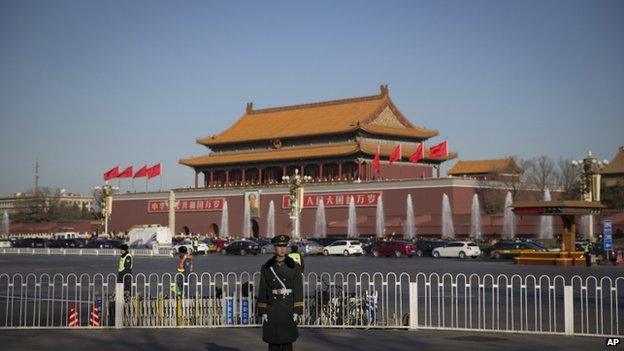Detained journalist Gao Yu on China's challenges
- Published

The 25th anniversary of political uprisings in Tiananmen Square is politically sensitive in China
For two weeks, Gao Yu's friends and family tried to find out what happened to the 70-year-old writer and commentator after she disappeared into police custody.
And now they know: she has been accused of leaking state secrets - a serious charge that could result in a lengthy prison term.
Ms Gao's lawyer, Teng Biao, told the BBC he agrees with online speculation that Ms Gao is being punished for her perceived connection to the release of "Document Number 9".
The internal Communist Party strategy was published by a Hong Kong newspaper's website last August. The memo warns party members of the dangers of Western liberal democracy and the rise of civil society.
Gao Yu recently told foreign journalists the authorities had warned her to keep a low profile during this politically-sensitive period - the 25th anniversary of the political uprisings in Tiananmen Square.
She is one of several dozen Chinese dissidents to be detained by the authorities ahead of the 25th anniversary of 1989 bloody clash between student protesters and Chinese soldiers in Tiananmen Square.
The BBC's Beijing bureau interviewed Gao Yu in March 2013 to hear her thoughts on the challenges facing Xi Jinping as he assumed his position as China's president.
She spoke at length on the economy, Chinese politics and many of the country's social challenges.
Watch an excerpt of an interview with Gao Yu recorded in March 2013
"China's economic success has come from having land and cheap labour, and producing products of low additional value mainly for the West," she said.
"Xi Jinping knows that we have hit the end of this road. He knows that we have to learn from the West and make innovations. He sees this, but whether he can change it is another matter.
"Another thing is the wealth gap mainly caused by corruption. We put our energy into creating a market economy, but the benefits we got from reform were basically taken by government officials.
"All capital is transferred to the hands of government officials and rich people, regardless of environmental protection, social security, medical insurance, education, etc. So now the relationship between people and government officials is very tense," she also said.
"Because the party's leaders have profited so much from the market economy, the whole world sees how corrupt our government officials are and how angry our people are. The legality of the party's rule is being questioned in peoples' hearts. This is the most important thing that Xi Jinping has to address."